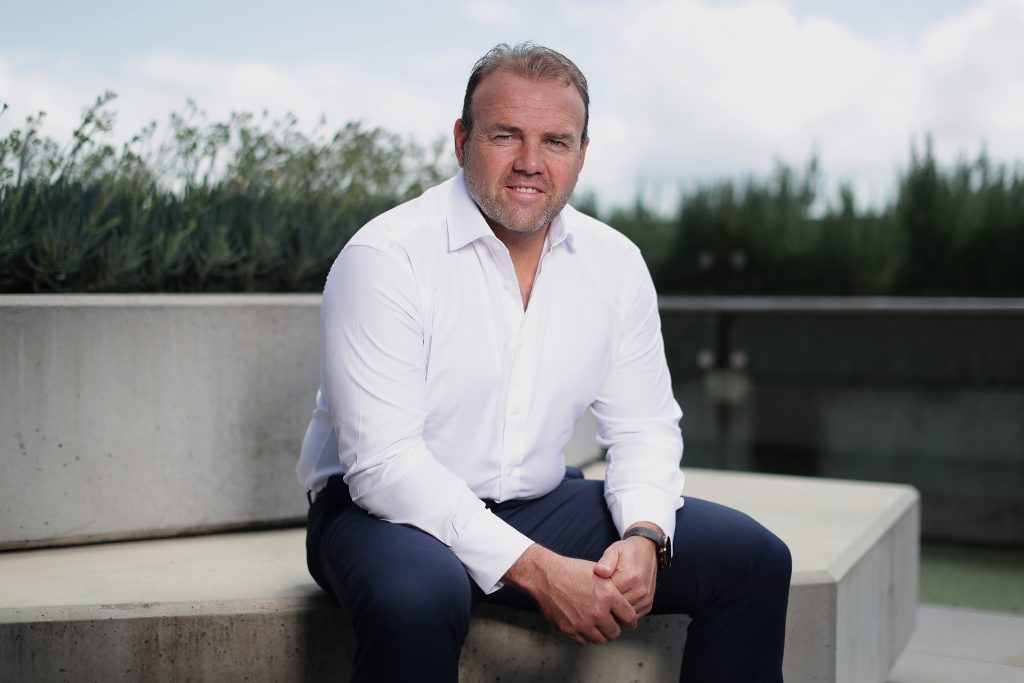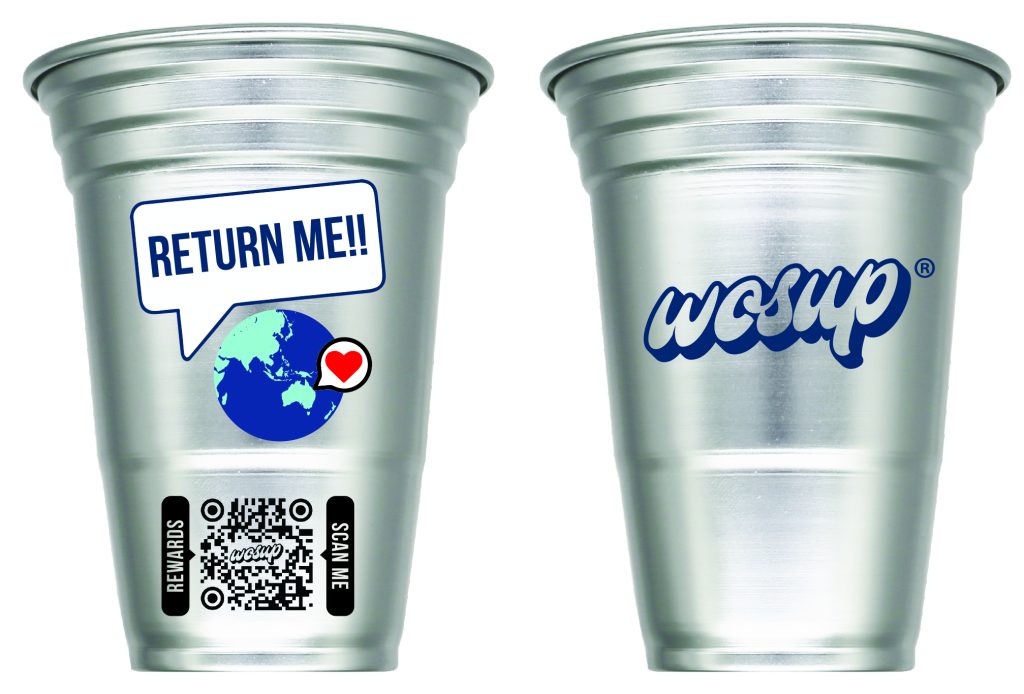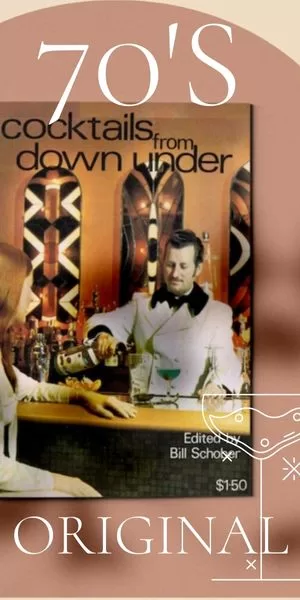(former) Rugby Australia CEO Andy Marinos poses during a Rugby Australia media opportunity at the RugbyAU Building on February 01, 2021 in Sydney, Australia. (Photo by Mark Metcalfe/Getty Images)
Social impact enterprise, War on Single Use Plastic (WOSUP), has ramped up its fight to eliminate the knock-on of plastic pollution from large-scale sport and entertainment events with the appointment of former Rugby Australia CEO Andy Marinos as Board Chairman.
WOSUP Co-Founder and CEO, Martin Salter, says Marinos’ appointment comes at a pivotal time for the Sydney-based venture following groundbreaking trials of its reusable and infinitely recyclable aluminium cups at major Australian stadiums, and ahead of plans to expand globally.
Since March, WOSUP has prevented approximately 34,000 single-use plastic cups ending up in landfill and delivered a total carbon reduction of 102,000kg CO₂-e (equivalent of 162 native trees planted by Greenfleet) via rollout of its sustainable beverage packaging solution at:
- Stadiums Queensland pilot, comprising a series of nine NRL and Super Rugby matches at Townsville’s Queensland Country Bank Stadium from March to July;
- Australian Turf Club Autumn Carnival at Rosehill Gardens and Royal Randwick; and
- Wallabies vs Argentina rugby union test match at Sydney’s CommBank Stadium in July.
WOSUP Reusable Aluminium Cup
Outside Australia, Salter said WOSUP is trademarked as a sustainable brand in the United Kingdom, America, Europe, Japan, China, and New Zealand, with discussions “in play” to move into those markets in partnership with venues, sporting organisations and events.
“There’s no time to waste in the war on single-use plastic, so we are pleased to have secured Andy as Chairman, knowing his global influence, reputation and expertise will be invaluable as we help transition the sport and entertainment industry to a plastic-free, zero-carbon future,” Salter said.
He added that large-scale venues and events are among the world’s biggest contributors to single-use plastic cup waste, with Australia’s 65 stadiums and 43 arenas churning through an estimated 40 to 50 million disposable cups each year, with only 9% of all plastic ever made being recycled. By contrast, 75% of all aluminium produced remains in use, making it the most sustainable metal in the world, and a key circular economy building block.
“Our mission is to reduce global use of 50 million single-use plastic cups a year by 2030 and help sport and entertainment sectors, in Australia and globally, become carbon neutral by 2050 or earlier.
“There’s no question that a shift to reusable and not just recyclable products is vital in the transition from an environmentally questionable linear economy to a circular economy.
“Put simply, prevention – stopping plastic production at its source – is the best cure for pollution that’s choking our planet, with at least 11 million tonnes of plastic ending up in the world’s oceans every year, adding up to a year-on-year accumulation of 162 million tonnes [based on 2021 data reported by EARTHDAY.ORG].”
According to a recent report commissioned by the Australian Marine Conservation Society and WWF-Australia, the plastic Australians consume in just one year produces as much greenhouse gas as 5.7 million cars on our roads annually. Without concerted action to cut plastic production, it warns annual emissions from Australia’s plastic addiction will more than double to 42.5 million tonnes by 2050 (the year Australia has legislated to reach net-zero emissions).
Sharing WOSUP’s belief that sport has a profound capacity to motivate people en masse to adopt sustainable behaviour change, Andy Marinos said he looked forward to putting 20 years’ experience in business and sports administration to good use, “creating a cleaner, greener planet for future generations”.
Prior to his term as Rugby Australia’s CEO, the former Rugby League and Union International player spent five years as CEO of the Southern Hemisphere’s rugby body, SANZAAR.
“With the eyes of the sporting world firmly fixed on Australia in the coming decade, I look forward to playing a role in driving positive change by helping WOSUP achieve its mission to embed closed-loop reuse practices and sustainable supply chains where the biggest impact can be made at large-scale venues and events,” Marinos said. He agreed “there’s no time to waste in the war on single-use plastic if Australia is to meet its 2050 net-zero target”.
“I’m also a firm believer that sport has the power to drive change, and my focus will extend beyond Australia as global fans, codes, teams, venues and sponsors seek a values-exchange with brands and partners that drive ethical, sustainable practices.
“This is where WOSUP steps up, providing a win-win for people and planet.”
Marinos’ appointment as WOSUP’s Board Chairman marks his first ‘what next’ announcement after stepping down as Rugby Australia’s CEO, in June, having achieved his goals to re-establish rugby as a leading code in Australia. Credited for steering the organisation through financial difficulty in the wake of the COVID-19 pandemic, he turned a $27.1 million loss in 2020 (prior to his appointment) into an $8.2 million surplus in 2022.
His tenure also resulted in Australia winning hosting rights for the 2027 and 2029 Rugby World Cups and securing the 2025 British and Irish Lions Tour, with other legacy projects including implementation of strategy to professionalise Women’s XVs Rugby, and finalisation of a new four-year Collective Bargaining Agreement for professional men’s and women’s players.
As WOSUP expands operations, Salter said Marinos will help pave the way to engage more broadly with senior stakeholders in sports and government, as well as internationally. His appointment follows the May 2023 addition of Mamamia Media Company Chief Revenue Officer, Tony Prentice, to WOSUP’s board.
“I’m excited to have Andy helping the team deliver our strategy and refine our approach to best fit the commercial needs of sporting codes, alongside our dual focus of enhancing spectator experience,” Salter said.
He said WOSUP cups, designed to keep drinks colder for longer, provided a cost-effective solution for venues to ditch single-use plastic, boost sustainability targets and create real-time dialogue with fans thanks to a bespoke technology platform, WOSUP Rewards, delivering information, money-can’t buy experiences, competitions and offers.
Doubling as platform for eco-conscious venues, sponsors and other partners to showcase environmental, social and governance (ESG) initiatives, the WOSUP Rewards loyalty program (built into cups via customised QR codes) introduces a plug-and-play solution for a dynamic new sustainability sponsorship category.
Did you know? As part of its commitment to sustainability, WOSUP commissioned an independent life cycle assessment (LCA) by Lifecycles into environmental advantages and disadvantages of its reusable aluminium cup, compared to four alternatives. Namely, three single-use products: polyethylene terephthalate (PET) cup; polylactic acid (PLA) cup; and an aluminium can. Plus, one reusable plastic cup made from polypropylene (PP). Based on delivery of one drink, the WOSUP cup was found to have the lowest impact on climate change, fossil fuel depletion, water scarcity and soil quality, with a carbon footprint of 32g CO₂-e, compared to reusable PP (50g CO₂-e); and single-use alternatives PLA (47g CO₂-e); PET (43g CO₂-e) and an aluminium can (244g CO₂-e). In a win-win for people and planet, the LCA concluded WOSUP’s native tree planting partnership with Australia’s first carbon offset provider, Greenfleet, created a net carbon abatement of 3kg CO₂-e per use, alongside positive land use outcomes.
About WOSUP
WOSUP (War On Single Use Plastic) exists to help address one of the greatest environmental problems facing the world today – too much plastic waste. WOSUP Co-Founders Martin Salter and Karl Page were drinking beers at the footy when they found themselves sitting amid a sea of plastic cups. They began re-using their plastic cups and contemplating an alternative, eco-friendly solution. In 2018, WOSUP Australia was born. The Sydney-based social impact enterprise strives to make a difference by providing sustainable alternatives to single-use plastic. By creating 100% reusable aluminium cups and providing integrated services, complete with fan engagement technology, WOSUP offers a meaningful solution for public-facing service industries to ditch single-use plastic cups. WOSUP cups are the perfect fit for major sport and entertainment venues, festivals, clubs, pubs, cinemas, hospitality and tourism attractions. For more information, visit www.wosup.com.au



